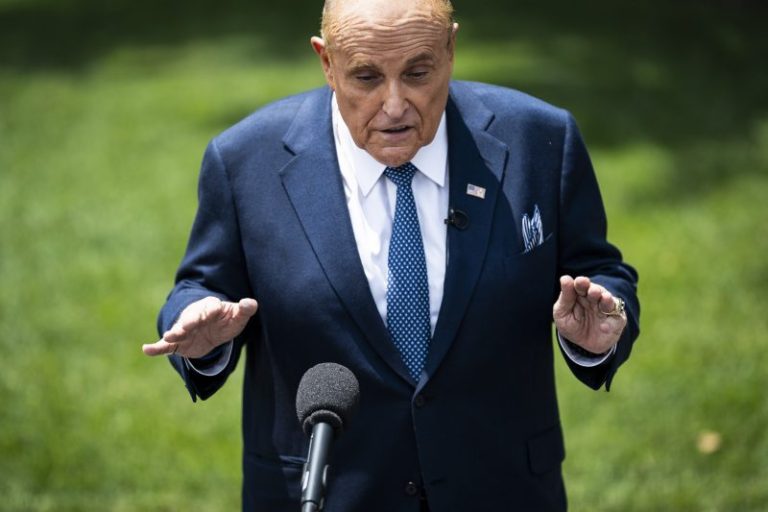The allegation comes in a lawsuit filed this week by Noelle Dunphy, a woman who worked for former New York mayor Rudy Giuliani from 2019 until 2021. It reads as follows:
“[Giuliani] asked Ms. Dunphy if she knew anyone in need of a pardon, telling her that he was selling pardons for $2 million, which he and President Trump would split.”
If she did, the allegation continues, she should “refer individuals seeking pardons to him, so long as they did not go through ‘the normal channels’ of the Office of the Pardon Attorney” because those communications would otherwise be subject to Freedom of Information Act requests.
This is a serious claim that, given the implications for former president Donald Trump and his bid for the 2024 Republican presidential nomination, is worth considering in the context of what we know.
Dunphy’s lawsuit spans 70 pages, most of which articulate a slew of other allegations about Giuliani. It’s an escalation of a complaint issued in January, asking for $3.1 million in unpaid wages, punitive damages and legal fees, among other things. The new suit, though, goes further. Now seeking $10 million, it includes detailed allegations of abuse and harassment by Giuliani that are walked through on a nearly day-to-day basis.
In a statement to reporters, Giuliani’s attorneys said that their client “unequivocally denies the allegations raised by Ms. Dunphy,” in addition to attempting to cast doubts on her credibility by including a pejorative quote from a former boyfriend.
It’s worth noting that in addition to screenshots of alleged text message exchanges between Giuliani and Dunphy, the lawsuit also includes numerous references to conversations between Dunphy and Giuliani having been recorded. That allegedly includes a recording of Giuliani consenting to being recorded by Dunphy (though New York, where most of the alleged interactions occurred, requires only that one party consent to being recorded). It also allegedly includes Giuliani making disparaging comments about Jewish, Black and Hispanic people.
But back to the allegations about the pardons.
The allegation that Giuliani was offering pardons for $2 million has been made before. In January 2021, shortly before Trump left office, the New York Times reported that former CIA officer John Kiriakou had been “told that Mr. Trump’s personal lawyer Rudolph W. Giuliani could help him secure a pardon for $2 million.” Kiriakou rejected the request, but an associate worried about the legality of such an offer tipped off the FBI. Kiriakou was not granted a pardon.
The Times’s report on the small economy that sprung up around Trump’s pardon process spurred a request from Rep. Raja Krishnamoorthi (D-Ill.) to the Justice Department.
“I am writing with grave concern following recent reports that President Trump intends to issue as many as 100 pardons in his final day in office at the same time that his close associates have been selling access to the President to those seeking clemency for thousands of dollars and potentially far more,” Krishnamoorthi wrote to acting attorney general Jeffrey A. Rosen. A representative for Krishnamoorthi’s office told The Washington Post on Wednesday that he didn’t believe the congressman had received a response — in part because the letter was sent on Jan. 19, 2021, the day before President Biden’s inauguration and Rosen’s departure.
The letter also referred to another investigation into the pardon process revealed in a court filing the previous month.
“The Justice Department is investigating a potential crime related to funneling money to the White House or related political committee in exchange for a presidential pardon, according to court records unsealed Tuesday in federal court,” CNN’s Katelyn Polantz reported in December 2020. Polantz pointed to details in a heavily redacted court document.
It suggests that, in reviewing material collected from a number of electronic devices, investigators found emails suggesting “a related bribery conspiracy scheme, in which [redacted] would offer a substantial political contribution in exchange for a presidential pardon or reprieve of sentence.” Note that this is different from what’s alleged about Giuliani; here, the court filing notes, the promise was for “anticipated future substantial political contributions.”
Dunphy’s lawsuit suggests that the comment around pardons occurred in mid-February 2019. The bulk of Trump’s pardons occurred after that point, including scores during the period between Trump’s loss in the 2020 election and his leaving office. In fact, more than half of the pardons and commutations issued by Trump occurred between Jan. 6, 2021, and Jan. 20 of that year.
Importantly, February 2019 was likely near the apex of Giuliani’s power with Trump. (In the same period, he allegedly told Dunphy that he had “immunity” from breaking the law thanks to his relationship with Trump. That conversation was allegedly centered on Dunphy’s recommendation that Giuliani register as a foreign lobbyist given his work with Ukrainian officials — work that was likely linked to the efforts to dig up dirt on Biden that led to enormous scrutiny of Giuliani and to Trump’s first impeachment.)
If Dunphy’s presentation of her interactions with Giuliani is accurate, her depiction of Giuliani’s propensity for drunkenness and self-aggrandizement tends to diminish the idea that he and Trump had an agreement on granting pardons for cash. The Giuliani documented in the lawsuit wants constantly to impress Dunphy; perhaps any mention of pardons occurred in that same vein.
If Giuliani wasn’t simply blowing smoke — as the Kiriakou anecdote suggests — the implications are far more serious.

